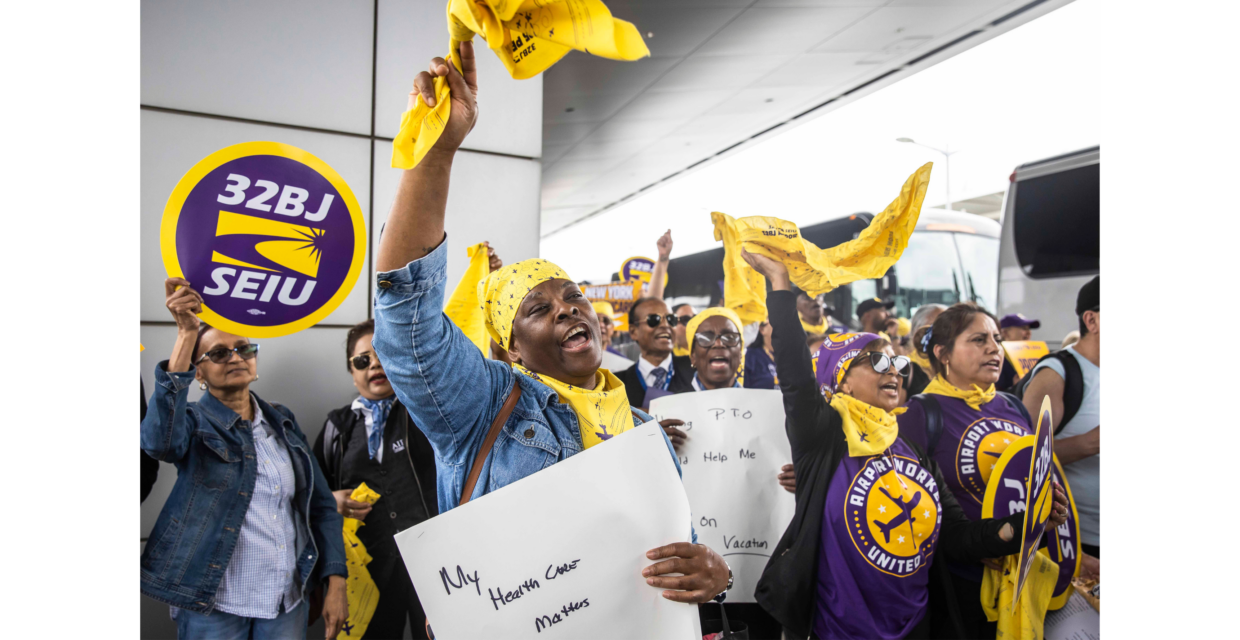
Summary
Key Takeaways
Airport service workers are the backbone of John F. Kennedy (JFK), LaGuardia (LGA), and Newark Liberty (EWR) Airports, yet they face challenging conditions that drive low morale and high turnover rates. Low pay and insufficient benefits exact a toll on workers trying to support themselves and their families in the high-cost New York City metro area; and have a negative impact on the integrity of airport operations because when airport workers leave for higher-paying or less stressful jobs, they take their skills and experience with them.
Key Solutions
To achieve a stable workforce and ensure high safety and service standards, the PANYNJ must work with New York and New Jersey State leadership to improve airport service worker standards in the following ways:
- Raise the minimum required wage from the current $19 to $25 per hour, with adequate annual increases.
- Amend the New York Healthy Terminals Act to raise New York’s benefit supplement requirement and ensure parity between New York and New Jersey airports by requiring at least the health and welfare rate stipulated by the federal McNamara-O’Hara Service Contract Act (SCA), so the rate adjusts with rising healthcare costs and is on par with the contribution level in New Jersey.
- Amend the New York Healthy Terminals Act to raise New York airports’ paid leave benefits to the same levels permitted at Newark Airport by requiring holiday and paid leave at the rate stipulated by the SCA.
- Ensure the expanded protections cover the groups of New York airport workers currently excluded from the New York HTA (part-time workers and cargo, ramp, and concessions workers) as well as off-site cargo and warehouse workers.
These increases to the required minimum wage and benefits standards are necessary for safe airport operations and are completely reasonable considering the airline industry’s financial health.
Why This Matters
While forward-thinking policies from the Port Authority of New York and New Jersey (PANYNJ), as well as New York and New Jersey State leadership, have improved wages and benefits over the past decade, progress has stalled since the PANYNJ’s last wage action in 2018, threatening workforce stability and airport safety.
In collaboration with state governments, the PANYNJ must now renew its longstanding commitment to safeguarding airport security by updating service worker standards, building upon years of policy innovation.
In 2018, the PANYNJ Board of Commissioners voted unanimously to update its wage policy and institute a $19 wage floor by 2023 for the majority of airport workers at LGA, JFK, and EWR airports.
The 2018 PANYNJ wage rule amendment was followed by state action: in 2020 and 2021, New York and New Jersey respectively adopted their Healthy Terminals Acts (HTA), requiring airport employers to provide a benefits supplement to covered employees.
These wage and benefit policies improved labor standards for airport workers in the region, but have eroded since their passage.
Inconsistencies between the two states’ laws have put New York workers behind their counterparts in New Jersey. New York set its benefits supplement at a fixed hourly rate that has not risen to reflect the changing cost of healthcare, and unlike New Jersey, New York’s HTA does not provide workers with paid time off.
Exclusions from coverage have left key groups of workers unprotected. New York’s HTA excludes ramp, cargo, tarmac maintenance, concessions, and part-time workers. Cargo workers employed in facilities just outside airport grounds have also been shut out of wage protections.
Failure to update wage and benefits levels and close gaps in coverage may pose a serious risk to worker and public safety, compromise passenger service, and make it even harder for workers to make ends meet in one of the highest cost-of-living areas in the United States.
Note on Citations
Citations to data sources are available in the full report PDF.



